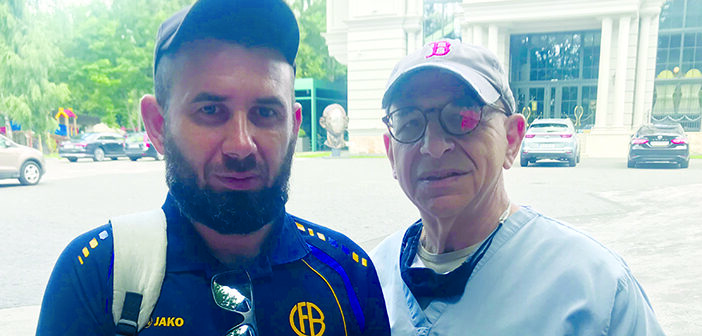Helping refugees in Ukraine was ‘the right thing to do,’ veteran says.
In a refugee camp in Lviv, Ukraine, a white-and-red trailer with images of the Red Cross and Rod of Asclepius stands by the train tracks. For almost two weeks last summer, that trailer was home for Michael Siclari RES’88, MD, MPH, a Providence VA emergency physician who had volunteered to provide medical support for the camp.
While Siclari was new to Ukraine, he was not a foreigner to medical care in times and places of armed conflict. A veteran of the Army Medical Corps, he had cared for casualties at a field hospital near the Pakistani border during three months of the Afghanistan War in 2012.
“That was probably the most satisfying experience that I had in my career—up until going to the Ukraine,” Siclari says.
Before becoming a physician, Siclari completed his Master of Public Health at Yale and taught high school students. He went to Dartmouth for medical school and then Roger Williams Hospital for his internal medicine residency.
When the war in Ukraine began, Siclari recognized the necessity of his experience. “Here was a bona fide need with a truly moral justification,” he says. He felt that “the right thing to do is to leave the security of job, of home, of family, to overcome the questions and concerns of those around you, and leave that safety net for something bigger than me.”
Siclari had long been called to emergency medicine, in part because of its amenability to more equitable care.
“When you came into the emergency room on a stretcher having a heart attack, you are all equal,” Sicalri says. “The fact that there [were]people there that could render some assistance to make that day just a little bit easier and mitigate that misery, that I found to be extremely attractive.”
Siclari connected with the Folkowisko Foundation, a Polish organization establishing points of shelter and care near the western Ukraine border. Siclari provided medical assistance and helped transport those requiring more advanced care.
He fondly remembers the people he met there. “Although they had absolutely nothing and their lives had been devastated, they maintained an optimism, they maintained positive spirits, they took care of each other,” he says.
Siclari’s experiences in education were also reflected in his work at the camp. He was on Brown’s clinical faculty for more than 20 years, and has taught emergency care skills as medical director for the American Safety Programs in Training. He continues to train medical students and residents at the VA.
“That’s part of the job that I find extremely gratifying and satisfying,” he says.
In Ukraine, Siclari taught children English and skills like tying a tourniquet. In turn, they taught him words in Ukrainian. He relied largely on volunteer translators and translation devices throughout his stay to communicate with his patients.
He has remained in contact with Folkowisko since his departure, but the lack of medical providers who could take his place concerns him.
“It broke my heart to close the door on the trailer the day I left, because I wasn’t quite sure if that was going to be reopened,” he says. “When I returned back [home], I was probably as down as I had been after deployment to Afghanistan. I found it to be a difficult transition to make.”
Recalling a 2-year-old boy who would come by his trailer, Siclari puts the situation into perspective: “I left, he stayed.”




